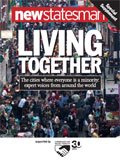The age of the plural city: when we are all minorities

The number of plural cities - cities where no one ethnic group holds the demographic majority - is increasing around the world. This emerging issue for race relations is yet to receive due attention both domestically in the UK and on the global stage, accordinf to the Commission for Racial Equality (CRE).
Trevor Phillips, Chair of the CRE, said: "There are two possibilities in terms of how we approach the fact of plural cities: we can be energised, and draw on the creativity of our diversity; or we can be fractured and hence find ourselves in cities which are depressed and divided."
"The good version of the future is not going to happen by accident. They are going to happen by our design, by the agency of public policy, by what people do in civic society."
If we get it right, the successful cities will be beacons for a different kind of world."
Opportunities available to plural cities include the potential for increased economic prosperity, entrepreneurship, international trade, and tourism.
With migration to cities expected to increase worldwide, plural cities are quickly becoming one of the most important consequences of globalisation, and raise a number of, as of yet, unanswered questions:
- How will this affect political representation and leadership?
- How can local governments truly reflect the diversity of the communities they represent?
- What are the implications for urban planning?
- Does regeneration offer opportunities for positive change?
- How can bridges be built between ever more diverse communities?






